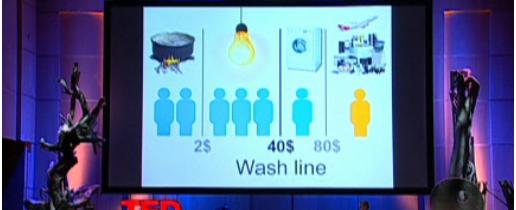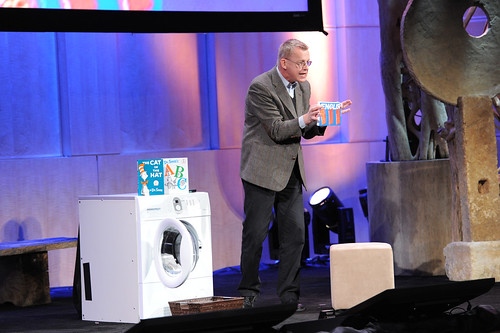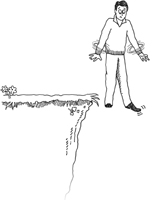 Once the talk began, I was immediately engaged by the props Rosling used to tell his story. They were, as mentioned before, the basis of the argument but not too distracting either. Being from Sweden, I was also intrigued by his accent and also his account of worldly issues. I do not think he said too much, and this certainly wasn't the best TED talk I have seen (he did not use many facts or details in his thinking), but somehow I got a lot out of it. This may be from my external readings in A Whole New Mind and Drive. The silly manner in which Rosling presented himself was also somewhat unprofessional but intriguing. While he talked about the poverty line and what he calls the "air-line" or very much above poverty, he created a sub-category called the wash line. This was a humorous play on words because he identified the portion of the population that could afford washing machines; again, adding his experience to the mix. Toward the end when he finally got to his main point, he used props again in an unexpected way when he said that washing machines let his family read more. Instead of just stating this fact, he had an assistant pass books out of the fake washing machine to him, symbolizing the relationship.
Once the talk began, I was immediately engaged by the props Rosling used to tell his story. They were, as mentioned before, the basis of the argument but not too distracting either. Being from Sweden, I was also intrigued by his accent and also his account of worldly issues. I do not think he said too much, and this certainly wasn't the best TED talk I have seen (he did not use many facts or details in his thinking), but somehow I got a lot out of it. This may be from my external readings in A Whole New Mind and Drive. The silly manner in which Rosling presented himself was also somewhat unprofessional but intriguing. While he talked about the poverty line and what he calls the "air-line" or very much above poverty, he created a sub-category called the wash line. This was a humorous play on words because he identified the portion of the population that could afford washing machines; again, adding his experience to the mix. Toward the end when he finally got to his main point, he used props again in an unexpected way when he said that washing machines let his family read more. Instead of just stating this fact, he had an assistant pass books out of the fake washing machine to him, symbolizing the relationship.Through his chart of wealth lines and finally his ending statement, Hans Rosling got to the point. It is important to somehow bring the poverty line people into industrial life and reduce rich people's energy use to help the others with their lack. The result, is the people formerly in poverty get time to improve their educations as well as their qualities of life, so hopefully they will become part of society.
Personally, my whole life is reliant on machines such as the washing machine or coffee maker especially. This is a good and bad thing in my opinion. Yes, I can focus on more meaningful tasks, but I sometimes enjoy those tasks as a break from overloading my brain with deep, connective thoughts. I find turning on music and doing something necessary but not always worth while a relief from racking my brain constantly, but that's just me. In the world of education, this TED presents three problems for students to develop solutions; energy issues, economic issues, and social issues once the new middle class people are invited into "mainstream" society. The world as a whole will have to adjust society because there will be new competition and new cultures to deal with on a more leveled playing field. I wonder how that might play out with all the selfish people and dictators today...
Pictures: 1) http://www.kunskapspriset.se/images/2007/press_finalister/hans_rosling_hi.jpg
2) http://thesocietypages.org/socimages/files/2011/04/washing-machine.jpg
3) http://farm6.static.flickr.com/5283/5242553656_5053c2bc1b.jpg








